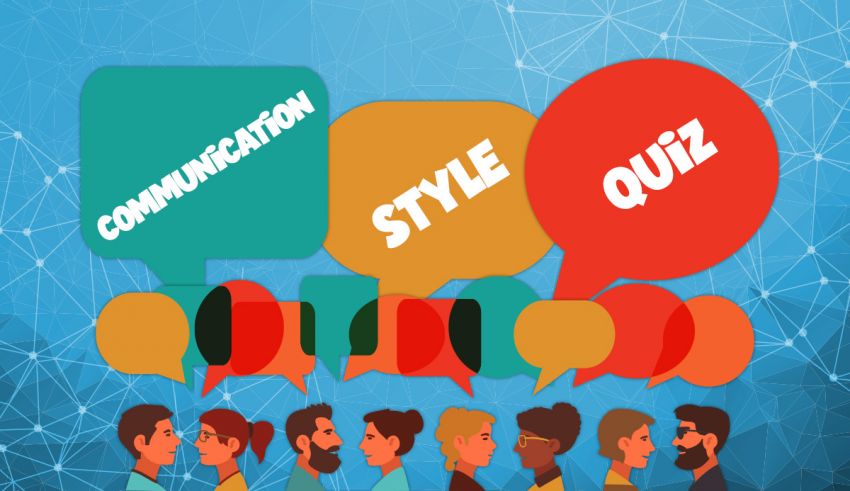Which type of communicator are you—functional, analytical, interpersonal, or intuitive? Based on your personality, this 20-question quiz on communication style can tell you what it is.
Starter Kit for the Communication Style Quiz
The test’s goal is to determine what kind of engagement technique you prefer to employ. Even though there are other speech styles that humans can have, studies have shown that the majority of us only have two.
You learn what your primary dialogue pattern is and why in this section.
· What Does Communication Mean?
According to the Transactional Model, “message exchange between the speaker and listener occurs during communication.”
· What Are Its Different Styles?
Human relationships can be divided into four categories: analytical, personal, intuitive, and functional. The aforementioned forms are also referred to as “Communication Styles.”
· How Do You Identify Someone’s Interaction Style?
The eight components of speech—friendliness, animation, attention, argumentativeness, drama, openness, emotional state, and dominance—are the best indicators of a person’s speaking and listening style. (More below on this.)
· Why Do I Need to Take the Quiz?
You can improve your communication skills by becoming aware of your trade habits. Each fashion has benefits and drawbacks. Knowing them also makes it easier for you to communicate with them.
Defining the 4 Types of Communication
Speech and listening patterns influence all types of conversations, not only the romantic ones, in contrast to some relationship-focused categories like the Love Languages. Here are the definitions of the four main dialogic types and how they could affect your regular conversations.
Analytical
Data and information are important to someone with an analytical communication style. Such a person would struggle to believe or support those who do not provide enough data or facts.
Advantage: Analytical discourse is useful in professional contexts.
Cons: People that speak in this manner can come out as dispassionate, cold, and distant.
Personal
You are a Personal Interaction Type if you value nonverbal emotional communication over spoken communication. If it describes you, you are a good listener who prefers to forge connections than avoid them.
Advantage: People who are good at communicating are solid problem-solvers. Additionally, they instinctively prefer to diffuse tensions.
Cons: These folks could come out as being too sentimental in a professional situation.
Intuitive
If you communicate intuitively, you focus on the big picture. Your discourse may be vague. And you find it overwhelming when people concentrate on the minor details rather than the big point.
Advantage: Speedy communicators are intuitive. Leaders and professionals alike want the style.
Not a terrific choice for teaching a subject, in fact. Speeches made intuitively may overlook crucial elements.
Functional
Functional communicators pay more attention to the small print than to the large picture.
Positive: Effective teachers and explainers.
Cons: It’s challenging to keep the listener(s) interested.
key elements of communication styles discovered by researchers
Eight factors, according to recent statistics, define your interaction style. The main factors that determine your style are friendliness, liveliness, attention, argumentativeness, drama, openness, emotional state, and dominance.
However, study of the aforementioned data revealed that dominance, emotional state, openness, and expressiveness all contribute more to establishing a person’s speech pattern than did the other variables.
Therefore, the ideal speaker is one who is more assertive, open, expressive, and at ease.
How to Change Your Approach to Prevent Miscommunication
The Communication Style Quiz aids in the analysis of your regular conversations. To improve as a negotiator, though, requires more than that. So here are the four strategies you need to master in order to talk clearly.
Active listening instead of passive hearing.
To be heard, you must first hear. Active listening is distinct from waiting for someone to finish speaking before you speak again. Avoid passive listening if you want to enhance your communication style.
Paying attention to nonverbal signals.
Not all messages can be conveyed in words. A skilled communicator examines both the arguments and the other person’s body language and gestures.
Keeping it a two-way interaction.
Forced conversations never end well. Allow the other person to respond to your expressions and enough time for them to adequately express themselves.
Avoiding biased thinking and perceiving.
It is determined by the communication style quiz if you are a biassed speaker or listener. But it is simple to understand that. There is a good likelihood that you are a subjective negotiator if you believe that you are always right and that people don’t get you. But only impartial speakers can produce constructive dialogue. So, before starting a conversation, you might want to let your presumptions go.
Prior Information for the Communication Style Test
The potential for miscommunication exists whenever two people are speaking. Others might cite the nature of their interactions as a justification for their inappropriate behaviour, rudeness, or even a lack of bargaining skills. So, before taking the test, keep the following in mind.
Dominance in speech is about responsibility.
Dominance is not demonstrated by preventing others from speaking while you are speaking. Dominance in human affairs refers to the capacity to direct and control a speech. This involves respecting your listeners, letting others speak first, and managing your time.
Openness is increased when you let out some personal info.
One of the biggest causes of miscommunication is robotic dialogue. Instead of creating a talking doll for yourself, have more in-depth conversations. It’s simpler for your listeners to participate in the conversation if you share some of your own experiences and emotions.
Now let’s take a fun and interesting quiz to determine your communication style.
For more personality quizzes check this: Are You A Wizard Or A Muggle.





